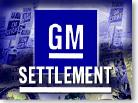|
Crippling GM strikes over
|
 |
July 28, 1998: 6:22 p.m. ET
UAW reaches pact with automaker pending ratification from rank and file
|
NEW YORK (CNNfn) - General Motors Corp. and the United Auto Workers Union Tuesday finally reached a tentative agreement to end a 54-day walkout that knocked out nearly all of the automaker's North American production and idled nearly 200,000 workers.
According to terms of the agreement, which still must be ratified by union members at two striking parts plants in Flint, Mich., GM agreed to drop its grievance against the UAW and to refrain from selling the Delphi East plant in Flint and a pair of brake plants in Dayton before January 2000.
The agreement also allows the union to keep so-called "pegged rates'' at the Flint stamping plant's engine cradle operation. The policy, which allows workers to quit early if they reach production quotas, had been blamed for millions of dollars in losses at the plant.
In return, GM got a promise from the UAW to increase productivity and not to strike at a parts plant in Indianapolis and Dayton.
Did GM blink?
Industry analysts said the deal appeared to favor the union.
"On the surface, it doesn't sound like either side made a lot of headway from where they were eight weeks ago," said Michael Luckey, president of Luckey Consulting Group. "It certainly doesn't sound like GM got anywhere close to what they were bargaining for."
The Delphi plant was one of two key parts factories to go on strike early last month, forcing GM to virtually stop building cars and trucks in North America. Analysts estimate the 54-day walkout cost GM more than $2 billion in lost profits.
At a news conference in Flint, UAW leaders hailed the agreement and urged striking members to ratify the tentative pact on Wednesday.
"I know it's been a hardship on our membership, this strike, and a hardship on the community as well,'' UAW President Stephen Yokich said. (193K WAV) (193K AIFF)
The walkout, the longest against GM since 1970, underscored the bitter relations between the world's largest automaker and one of the nation's most powerful unions.
GM had accused the union of waging an illegal strike and at one point threatened to cut off health care benefits for nearly 200,000 idled workers.
In response, the UAW steadily increased the pressure on GM by scheduling a series of strike votes at other GM plants, including the GM Saturn plant, which until now had served as a model of cooperation between GM and the UAW.
"We will concentrate on resolving the issues at Saturn in the near future," UAW Vice President Richard Shoemaker said. "We're hopeful we can do that without confrontation. Only time will tell whether or not we're successful."
GM Vice President Gerald Knechtel said GM would "work very hard to work through the differences there."
"I think that Saturn, I hope, will successfully work through its issues and there will not be a strike there," Knechtel said. "Saturn is a very part of General Motors, a very successful part of General Motors in many ways."
Getting back on line will take time
But even though the automaker has found a bandage to stop the billions of dollars worth of hemorraging caused by the disputes, company officials acknowledged it will take time for production to return to full capacity.
"It could take up to a week to get the plants on line once we get the parts plants back to work," said Gerry Holmes, company spokesman.
Marathon talks between GM and the UAW began Saturday, the last day of a hearing in front on an independent arbitrator. Industry experts had speculated both sides feared an unfavorable ruling and were rushing to end the strikes before the arbitrator issued his decision.
The settlement is still pending ratification from the UAW's rank and file of locals 659 and 651. However, union locals rarely reject an agreement once it has been blessed by union leaders in Detroit.
Besides the two Michigan plants, the agreement also addresses festering issues at facilities in Dayton, Ohio, and Indianapolis, which also have authorized strikes.
The comprehensive agreement will be outlined to union membership at two separate meetings on Wednesday morning. Complete details are being withheld until ratification but some details included:
- one-time "special" payment to qualified GM workers for missed holiday and vacation pay.
- GM's commitment not to sell Delphi subsidiary plants in Flint and Dayton before January 2000.
- So-called "pegged rates" permitted at the Flint stamping plant's engine cradle operation in exchange for increased quotas.
- withdrawal of any arbitration requests and pending litigation.
- increased discussions between union and top-ranking GM officials.
At their height, the labor disputes halted 27 out of GM's 29 North American plants. Two facilities recently came back on line but the walkouts have still cost the automaker more than $2 billion.
GM (GM) shares rose 1-1/8 to 74-1/4 in composite trading on Tuesday.
|
|
|
|
|
 |

|

